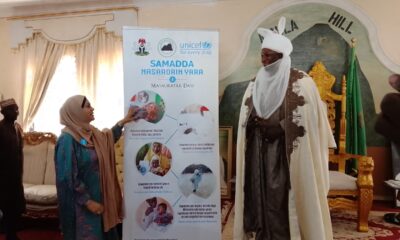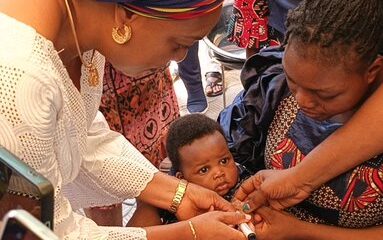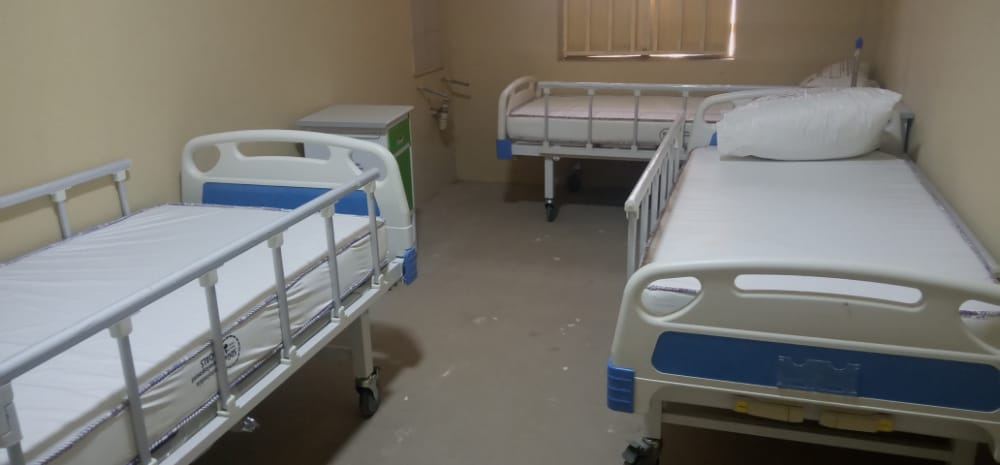Health
Why Immunisation Coverage Remains Low In Nigeria
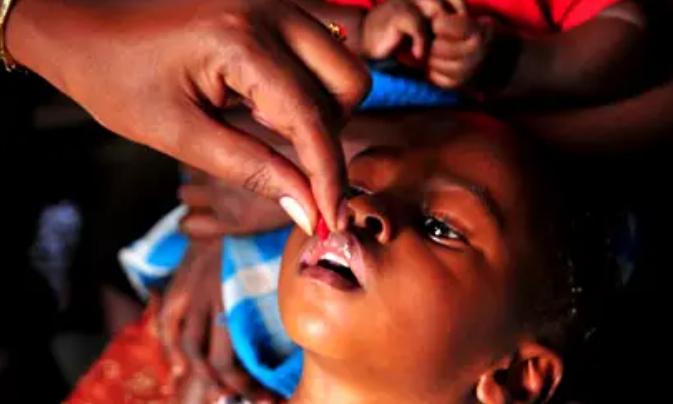
One of the major reasons Nigeria is committed to the goals of the Global Vaccine Action Plan, GVAP, was not only to ensure that at least 90 per cent of children under the age of 5 are immunised with all the relevant and available vaccines for children but to put to an end or reduce to the barest minimum child killer diseases.
Sadly, with the slow progress being made in immunisation coverage, Nigeria still falls short of the goal it set with only 57 per cent of children immunised in the last five years, according to the 2021 Multiple Indicator Cluster Survey, MICS, and the National Immunisation Coverage Survey, NICS, jointly released by the Nigerian Government, the United Nations Children’s Fund, UNICEF, in partnership with other partners.
Findings by Good Health Weekly showed that many mothers and caregivers still have reservations about immunisation, leaving Nigeria with only 36 per cent of children aged between 12 and 23 months receiving all recommended vaccines, according to the 2021 MICS.
Even though the benefits of vaccines are fully realised when children receive all recommended vaccine doses promptly, many of these children receive incomplete doses.
READ ALSO: Polio Immunisation: Over 1m Children Targeted In Bauchi
A case in point is that of Abdul Abdul. At age 1, Ahmed received only one immunisation which was given to him a few days after his birth at one of the Lagos State Primary Healthcare Centres.
Bola, Abdul’s mother, said he was not himself after the first dose of BCG, which discouraged her from returning for the other immunisations.
“I was afraid that my child would have more complications if I went back for another immunization. He had a fever for days. Although I tried to go back for measles the day I went to the PHC, we were told to come back and I have not been able to go back due to time and he is now more than nine months. I lost my first child I don’t want to lose another. ” she said
Like Abdul, many children in Nigeria have either received one or two immunisations and some have not received any at all due to unsubstantiated reasons.
Today, immunisation coverage in Nigeria is below GVAP goals, putting millions of children at risk of vaccine-preventable diseases all thanks to these unfounded factors.
However, findings by the MICS report, showed that gaps in routine immunisation in Nigeria. It shows that 64 per cent of children aged 12-23 months did not receive all routine immunisations, 46 per cent did receive but not all doses, 18 per cent did not receive any one, and 30 per cent thought the child was fully immunised.
Other reasons found by the survey showed that 51 per cent lack knowledge or information, while 7 per cent complained that the immunisation site was too far and 19 per cent was due to service delivery issues and 11 per cent reported that mothers or caregivers too were busy, 24 per cent lack of time or other family issues, 11 per cent had fear of side reactions and 26 per cent due to mistrust or fears.
According to the report, a fully vaccinated child must have received all 1YL antigens including BCG, OPV0, HepB0, OPV1-3, IPV, Penta1-3, PCV1-3, YF, Meningitis A & MCV1.
Sadly, even though the benefits of vaccines are fully realised when children receive all recommended vaccine doses promptly, only 36 per cent of children aged 12- 23 months received all recommended vaccines in Nigeria. The report also notes that more children were fully vaccinated in the southern zones compared to the northern zones.
From the survey, nearly 2 of every 4 rural children received Penta3 and children in the richest quintile were more than twice as likely to receive Penta3 as those in the poorest quintile.
“Immunisation coverage varies dramatically across Nigeria and improvements are needed in nearly every state,” the report stated.
However, the report also found that two states -Ebonyi and Enugu have estimated leads among states with the lowest number of children not vaccinated.
The two states have the highest number of Penta3 coverage above the 90 per cent goal. Penta3 coverage is notably higher in the southern zones than in the north.
“Children are significantly less likely to have received 3 doses of pentavalent vaccine if they are from poor families or rural families or if the child’s mother is younger than 25 years of age or has a low level of education,” the report revealed.
In the NICS 2021 survey, only 56 per cent of children showed a child health card and the availability of child health cards varied across states, with a high of 98 per cent in Ebonyi and a low of 16 per cent in Sokoto. States with low immunisation coverage also had low card availability. Child health cards are important health records critical for evaluating immunisation status.
It also found that in 3 of 6 zones there are significant differences in zero dose prevalence between urban and rural households, with rural children more likely to be zero doses. In 4 of 6 zones, there are significant differences across one or more categories of maternal education, with less educated mothers likely to have zero-dose children. In 5 of 6 zones, there are significant differences between the poorest and richest wealth quintiles, with poorer households more likely to have zero dose children.
READ ALSO: Rotary Club Not A Religious Organisation, Secret Society, Says President
UNICEF’s Chief of Monitoring for Result (M4R), Mr Claes Johanson who traced most deaths of children to lack of immunization, told Good Health Weekly that, although the 2021 immunisation report showed a little improvement from the 44 per cent and now 57 percent, has a huge impact on child mortality. He said women’s education has a huge impact on immunisation.
Johanson who said the smallest proportions of children who did not receive any vaccinations are found in Enugu with 1 per cent, Ebonyi, 0 per cent and Sokoto with 51 with r cent said the benefits of vaccines are fully realised when children receive all recommended vaccines doses promptly.
Johanson said while there was a little progress, there was room for improvement, adding that, action should be a priority for the Nigerian government.
VANGUARD
Health
LASG FLags Off Polio Outbreak Response Campaign
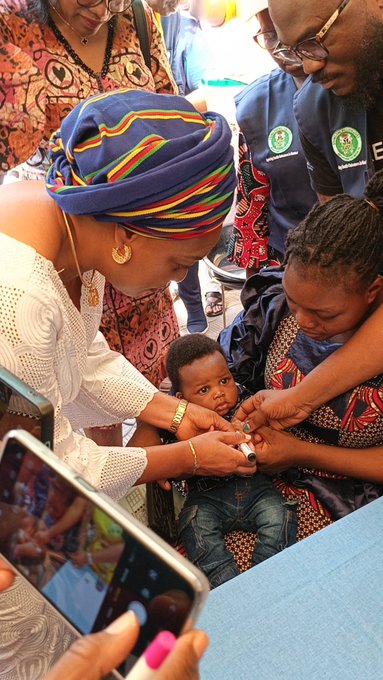
The Lagos State Government, through the Lagos State Primary Health Care Board, has launched the 2025 Polio Outbreak Response Campaign, reaffirming its commitment to eradicating polio and safeguarding the health of its children.
The ceremony, held at the Simpson Primary Healthcare Centre, was led by the First Lady of Lagos State, Dr. (Mrs.) Claudiana Ibijoke Sanwo-Olu, represented by Mrs. Widad Jumoke Mustafa, a member of the Committee of Wives of Lagos State Officials (COWLSO).
In her address, the First Lady emphasised the state government’s proactive measures to keep Lagos polio-free, highlighting the critical importance of the campaign in preventing the debilitating effects of poliomyelitis, which can result in paralysis or death.
READ ALSO: IMPEACHMENT: Lagos Ex-Speaker, Obasa’s ‘Sins’ Revealed
The First Lady also called on parents, community leaders, and stakeholders to support the campaign by ensuring eligible children are vaccinated.
Targeting children aged 0-59 months, vaccination teams will administer the Oral Polio Vaccine (OPV) to prevent virus transmission.
Dr. Kemi Ogunyemi, the Special Adviser on Health, expressed gratitude to Lagosians for their continued cooperation in the fight against polio. While appreciating all healthcare workers and partners for their services, Mrs. Ogunyemi encouraged parents to present their children and wards for the exercise.
Also speaking, the Chairman of Lagos Mainland Local Government, Mrs. Omolola Rashidat Essien opined that Immunization is key in ensuring that children are kept safe from polio and other vaccine preventable diseases.
Dr. Abimbola Bowale, the Supervising Permanent Secretary, Lagos State Primary Health Care Board, who also spoke at the event, underscored the life-saving importance of immunization.
“All children aged 0-59 months need multiple doses of the polio vaccine to ensure full protection. Any child missed represents a potential risk for the poliovirus to spread. The vaccine is safe, effective, and crucial in keeping our communities polio-free,” he stated.
Dr. Bowale also outlined several strategies to ensure the success of the campaign, including fixed post teams stationed at primary healthcare centres and public health facilities, house-to-house visits, and a transit strategy to reach special locations such as places of worship, schools, motor parks, and other public venues.
The event concluded with Dr. (Mrs.) Claudiana Ibijoke Sanwo-Olu officially launched the campaign, marking a renewed effort to maintain Lagos State’s polio-free status.
Headline
Lagos Cholera Cases Rise To 421

The Lagos state suspected cholera cases have risen to 421.
The Commissioner for Health, Akin Abayomi disclosed this on his Instagram handle @profakinabayomi on Saturday.
“As of June 20, 2024, an additional four suspected cholera cases have been reported, as illustrated in the accompanying graph,” he wrote.
He noted that the Emergency Operations Centre in collaboration with all relevant partners is actively engaged in contact tracing, community-based surveillance, awareness campaigns, sample testing, and ensuring that confirmed cholera cases receive appropriate medical treatment.
READ ALSO: Two Suspects Arrested For Stealing Car From Mosque During Juma’at Prayer
On Friday, the commissioner confirmed 35 cases out of the 417 suspected cases and 24 deaths across 20 Local Government Areas in the state.
The cases were reported from Agege, Badagry, Ikeja, Mushin, Ajeromi-Ifelofun, Epe, Ikorodu, Ojo, Alimosho, and Eti-Osa.
Others were Kosofe, Oshodi-Isolo, Amuwo-Odofin, Ibeju-Lekki, Lagos Island, Shomolu, Apapa, Ifako-Ijaiye, Lagos mainland, and Surulere.
Cholera is a food and water-borne disease caused by ingesting the bacteria— Vibrio cholerae — in contaminated water and food. Cholera can cause severe acute watery diarrhoea, and the severe forms of the disease can kill within hours if left untreated.
In Nigeria, cholera is an endemic and seasonal disease, occurring annually mostly during the rainy season and more frequently in areas with poor sanitation.
READ ALSO: Police Arrest 28yr Old Suspected Cultists, Recover Gun In Delta Community
The World Health Organisation on Thursday announced a spike in cholera in several regions of the world, with almost 195,000 cases and over 1,900 deaths reported in 24 countries since the start of 2024.
WHO said the Eastern Mediterranean Region reported the highest number of cases, followed by the African Region, the Region of the Americas, the Southeast Asia Region, and the European Region.
The global health body, however, noted that there are no reported cases in the Western Region, according to its bulletin released on Wednesday.
It said it exhausted its global stockpile of Oral Cholera Vaccines by March but was able to exceed “the emergency target of five million doses in early June for the first time in 2024.”
Health
AUTISM: What You Need To Know

By Silver Yeibake
Autism, commonly known as Autism Spectrum Disorder (ASD), is a neurodevelopmental disorder that affects communication, social interaction, and behavior. Autism is referred to as a spectrum condition since it can manifest in a variety of symptoms and abilities. While the actual cause of autism is unknown, evidence suggests that genetic and environmental factors interact to influence its development.
The risk factors include a sibling with autism, advanced age of parents, exposure to certain air pollutants and pesticides before birth, extreme prematurity, mothers with diabetes, immune system disorders or obesity, any difficulty with delivery leading to deprivation of oxygen to the baby’s brain, fever during pregnancy, lack of certain vitamins minerals during pregnancy, and certain genetic conditions, such as Down, fragile X, and Rett syndromes.
“Risk factors can not on their own cause a disease. However, they can increase the likelihood of that disease in a person.”
It is important to know that contrary to trending claims online, there is no scientific or medical evidence that vaccines or consumption of sugar are risk factors for autism.
READ ALSO: Kidney Stones: What You Need To Know
Autism is defined by difficulties in social interaction and communication. Individuals with autism may struggle to grasp social cues, maintain eye contact, and engage in typical back-and-forth conversations. Some people may also engage in meaningless, repetitive actions, such as hand-flapping or rocking, and have strong interests in specific areas.
It is essential to remember that autism is a lifelong diagnosis, but with early intervention and adequate care, people with autism can live fulfilling lives.
Autism treatment frequently includes behavioral therapy, speech therapy, occupational therapy, and social skills training. Each individual with autism is unique, thus interventions should be tailored to meet their personal needs and strengths.
In spite of the difficulties that autism can cause, many people with autism possess unique talents and abilities. Some people may succeed in fields such as music, art, mathematics, or programming, thus it is important for society to acknowledge and honor the qualities and achievements of people with autism.
In summary, autism is a complicated and diverse disorder that affects individuals in various ways. By raising autism knowledge, understanding, and acceptance, we can build a more inclusive society in which people with autism can thrive and attain their full potential.
Dr. Yeibake, Weriwoyingipre Silver.
Senior Registrar,
Faculty Of Pediatrics,
WACP

 Politics2 days ago
Politics2 days agoJonathan Dragged To Court Over Bid To Participate In 2027 Election

 Metro5 days ago
Metro5 days agoYouths Beat Ondo Monarch, Wife, Son During Festival

 News4 days ago
News4 days agoWhat I Found Out About Boko Haram — Obasanjo

 Politics5 days ago
Politics5 days agoCourt Declines Kachikwu’s Motion Against INEC, ADC Leaders

 Sports4 days ago
Sports4 days agoEPL Appearance: Iwobi Sets Record As Joint-highest Nigerian Player

 News4 days ago
News4 days agoVIDEO: Why I’ve Never Tried Convincing My Christian Wife To Convert To Islam — Tinubu

 Sports4 days ago
Sports4 days agoSuper Falcons Star Onumonu Retires From Football

 News4 days ago
News4 days agoSeven-year-old Nigerian Girl Stuns Crowd, Recites Longest Bible Chapter

 Sports5 days ago
Sports5 days agoEPL: Paul Merson Predicts Chelsea vs Liverpool, Arsenal vs West Ham, Other Fixtures

 Entertainment3 days ago
Entertainment3 days agoJUST IN: Season 10 BBNaija Winner Emerges

